Content Warning: This piece contains mentions of suicidal ideation, religious trauma, and homophobia.
I noticed from a young age that I was interested in both sexes. As a kid, I went to a private Catholic school from kindergarten through fifth grade before then attending a public middle school. I remember being preached to in second grade about how people who were gay (or any part of the LGBTQ+ community) were wrong and sinning. Some even went as far as saying they would burn in Hell. At that point, I wasn’t even thinking about the way in which my mental health could be impacted by being bisexual – I was just scared.
At the same time, I was lucky: neither of my parents ever taught me to hate, disrespect, or mistreat anyone, no matter what the reason. My non-immediate family, however, held the same ideas that my school was teaching and I saw my uncles, aunts, and some of my cousins mistreating people who came out in hopes of finding acceptance by shunning, leaving them out, and making them look dirty. By seeing this, how could I ever tell them about me?
The stigma and shame unfortunately didn’t end with my family. When I was older, I had two friends that I worked with at a community college who were sharing their struggles with what it’s like to be a part of the LGBTQ+ community. They were a lesbian couple, and I thought for sure I was in a safe space to confide in them about my bisexuality. After that, they never really spoke to me again, but I heard them talking about how bisexuality “isn’t a thing.” They thought that it was just a delay in becoming fully gay. That made me angry and confused, and also seriously affected my well-being.
I think those in the bisexual community often see the impact of their sexuality on their mental health. They are not taken seriously when they say they’re attracted to both sexes. The stigma that surrounds bisexuality, even within the LGBTQ+ community (such as you are either straight or you are either gay, there’s no other option) is taxing on the mind. It can make you doubt yourself, and your identity feels constantly under scrutiny. As someone who also lives with diagnosed paranoid schizophrenia, depression, and anxiety, and struggled with suicidal ideation throughout their teenage years and into adulthood, this extra trauma imposed on me because of my sexuality only further impacted my already declining mental health. When I was struggling with mental health conditions, I needed acceptance, care, and support, not only around my diagnoses but of me as a person.
Now, I’m twenty-six. I’ve never been in a relationship, but I know what and who I like. It was a long journey to be able to say that confidently, without fear of reprimand or shame. The community I was eventually able to build, and the resources I found, were a big reason behind that. For those also looking to better understand the connection between sexuality and mental health, I strongly recommend using Evokate, a tool that provides resources on issues intersectional with mental health. For me, the app is a safe space, where you can find a sense of community through the stories shared. Evokate in a non-judgment zone that addresses mental health in the bisexual community while also serving so many other experiences when it comes to people’s mental health: whether it’s sexuality, mental health conditions, BIPOC, suicide prevention, or so much more.
To those who have ever been invalidated because of their sexuality, or unwelcome in a space or community, know that you are perfect and deserve to take up space just as you are. You don’t have to justify yourself. You’re also not obligated to disclose your sexuality. Sometimes I feel pressured to have to tell the world I am bisexual because I don’t want people to think I am ashamed, but as I’ve shared, that can have serious impacts on my mental health depending on the situation, and it’s not something I’m always comfortable sharing. Do what is right to protect your own safety and mental stability. You don’t owe anyone a label – that is yours to own and share when you want.
Finally, even though at times it may feel impossible, no matter what your sexuality is, be proud! Be respectful, and don’t hold judgment of anyone else’s, most importantly your own. You are beautiful, important, and worthy. Sexuality is beautiful and important just like you!




